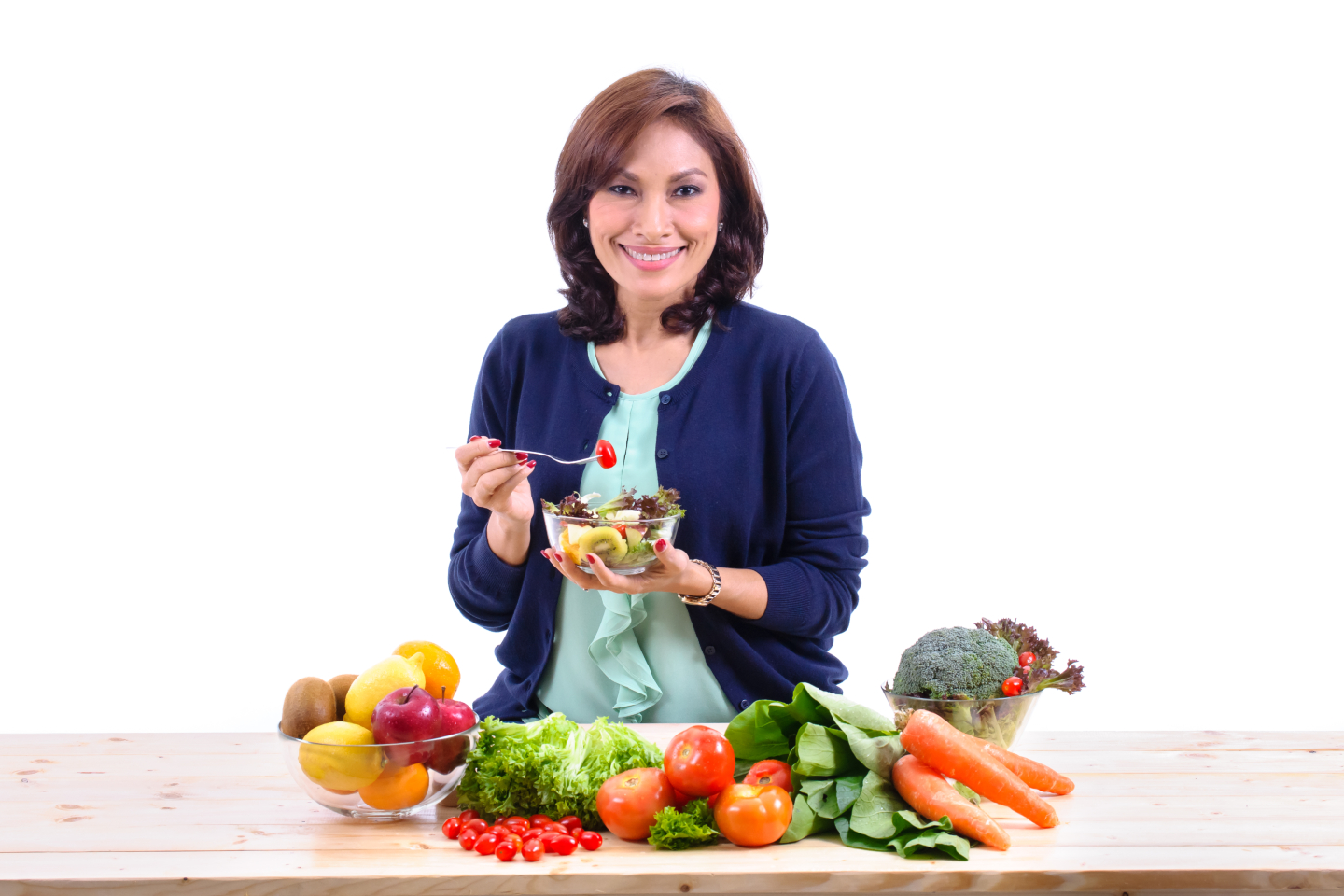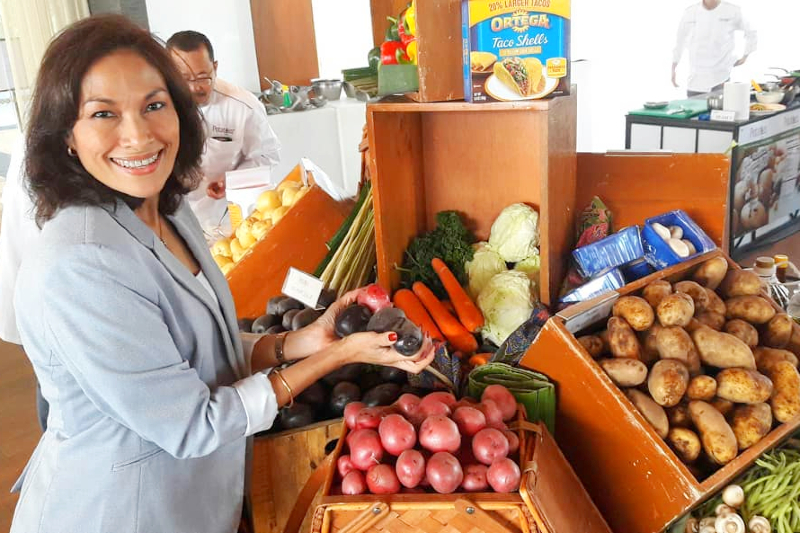
Indra Balaratnam is a seasoned dietitian with over 23 years of experience (All photos: Indra Balaratnam)
The Movement Control Order (MCO) restricts many businesses from opening but essentials such as supermarkets and grocery stores are still operational for the entire period. Yet, hundreds throng the stores and panic buy several trolleys-full of goods, often whatever they still get their hands on that can last the longest.
Triggered most probably by “herd mentality”, this behaviour not only leaves the old and the vulnerable with inadequate supplies but encourages a form of public gathering that might help spread the virus.
We speak to Indra Balaratnam, a seasoned dietitian with over 23 years of experience, to discuss the proper foods you actually need to buy and how much of it to get (spoiler alert: not trolleys-full) to keep your body sustainable and healthy.
Options: The government just introduced the Movement Control Order (MCO) from March 18. Should we be concerned with stocking up food amid the coronavirus pandemic?
Indra Balaratnam: There’s no need to panic buy and overstock on all kinds of packaged foods as we now know that we have a proper supply of food available. But since we’re in movement control mode, you want to at least keep a manageable supply of food for your respective families so you do not need to go out too often to minimise your exposure to others. As an example, before this, you may have gone to your local neighbourhood market every other day to get your provisions, but now you can buy a bit more and go only once or twice a week.
Consider a neighbour who may find it difficult to prepare a meal or grocery shop for themselves. Any form of help in this time will definitely be much appreciated.
indra_groceries.jpg

What kinds of food should one purchase to maintain a nutritional diet and how should they be stored?
As you plan out your grocery list, put foods you want to buy in the categories of protein, grains, vegetables, fruit, dairy and miscellaneous. All the various food groups provide you with the different nutrients you need for good health. Plus, when you group what you need to get this way, it'll help you to navigate through the markets or supermarkets quicker too.
Here are some good choices to help you with your grocery list when you can’t go out to the shops as often:
Proteins – Eggs, fresh/frozen meat and fish that you can keep in the freezer, canned tuna/sardine/meat, ikan bilis and dry/canned beans, nuts (including nut butters) and seeds.
Grains – Rice, bread, mee hoon, dry noodles, pasta, oatmeal, breakfast cereal, wholegrain crackers, tortilla wraps, semolina, millet or quinoa.
Vegetables – Do remember that leafy green vegetables can’t be kept for too long and need to be cooked. Choose sturdier vegetables that keep longer such as carrots, cabbage, celery, French beans, long beans, ladies’ fingers, bitter gourd, capsicum and tomatoes are some choices that keep well in the fridge longer. Consider frozen vegetables such as peas, corn and mixed. Root vegetables like potatoes, corn, sweet potatoes and yams are longer lasting choices too.
Fruit – Our local fruits are highly nutritious with vitamins, antioxidants and fiber. So there’s no need to bust your budget by buying expensive imported fruit. Think bananas, papaya, pineapple, guava, mangoes and jackfruit to name a few.
Dairy – Liquid or powdered milk, cheese and yogurt. If you don't take cow's milk, then consider other types of milk such as soya or nut milks.
Miscellaneous items required for your cooking – Cooking oil, salt, pepper, herbs and spices, sugar, salt, sauces, marinades, stock cubes, aromatic ingredients (onion, garlic, ginger, serai, turmeric, etc).
Some other handy tips:
a) Check the expiry date on your packaged foods and choose the batch that has a longer expiration.
b) Have some additional buffer stock than what you may be used to getting but there's no need to over buy.
c) Store the fresh vegetables in it air-tight containers or wrapped in newspaper to retain moisture.
indra_talks.jpg

How can we still maintain a healthy eating habit with the MCO in place?
From a dietitian’s perspective, you want to maintain your current good health, keep your immune strong and if you’re having a chronic health condition such as diabetes, high blood pressure etc., you’ll need to manage it well so that you don’t make yourself susceptible to an infection. These are the fundamentals of staying well.
However, with the crucial stage of the pandemic we’re facing right now, it’s imperative we take this seriously as reducing our exposure to others (i.e. social distancing) is our best defence to contain the spread of the virus. I highly urge you to have a game plan as a family on how to spend the time at home together to establish some sense of order for the duration of the MCO within your household.
With our movements restrained, exercising outdoors may pose a challenge. What sort of fitness routine would you recommend for the home-bound?
Getting some physical activity is important to diffuse pent-up energy, decrease stress and also reenergise. Since you can’t go to the gym, you can walk around your compound or neighbourhood or check out a YouTube video on exercises to do indoors. If you live in a condo, you can walk up and down the stairs for several minutes for a good cardio workout.
Would you recommend food delivery services?
Food delivery services can be helpful for people who absolutely need it, so it's important to evaluate your use of them. For most of us, cooking a simple meal is actually doable and more affordable in the long run. With the MCO, you may have more time on your hands to cook as opposed to when you were out working.
The more you are able to cook meals at home, the more you are lessening your dependence on food deliveries and take outs. And this in turn lessens the exposure from people who have to work to keep these services running during the MCO. To fight this pandemic, we need to co-operate in social distancing for everyone’s health and safety — even for the restaurant and delivery staff.
Indra Balaratnam runs her own private practice, Indra Balaratnam Nutrition, and conducts one-on-one dietary counselling, group nutrition workshops and consults for many FMCG corporations and NGOs, including Nestle and National Cancer Society Malaysia.
Her area of dietetic interests includes post-surgery recovery, weight management, pregnancy, childhood nutrition and chronic illnesses such as diabetes and coronary heart disease. Indra has been invited to speak at countless professional conferences and corporate wellness programmes and have co-written two nutrition cookbooks — Healthy Eating – Recipes for the Asian Palate and Healthy Family Meals — with chef Nicholas Pillai.
Get in touch with Indra Balaratnam via email at indra.balaratnam@gmail.com. Alternatively, visit her Facebook and Instagram page.


